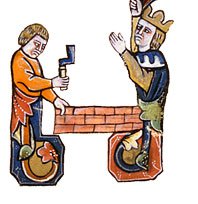Thoughts for the Day
Monday, 3rd January 2022: Labour in vain
God Psalm 127 Blessing Psalms
Reading : Verses from Psalm 127

* from the Palma Psalter
Unless the Lord builds the house,
those who build it labour in vain.
Unless the Lord guards the city,
the guard keeps watch in vain.
It is in vain that you rise up early
and go late to rest,
eating the bread of anxious toil;
for he gives sleep to his beloved.
(Church in Wales Lectionary, New Revised Standard Version)
Thoughts
In my mid-teens before entering the WRAF I lived in a small village in Sussex. The village had a pub called 'The Labour in Vain', and it's still there today. Its name puzzled me. What on earth did the words 'labour in vain' mean, and why apply it to a pub?
I had come across the words 'labour in vain' in my psalter years ago - in the days when we sang our way through the psalms on a regular basis - there it was in Psalm 127. It would have been sung centuries ago by those Hebrew pilgrims who walked up the steep mountain track probably from Jericho to Jerusalem, that same track that the Good Samaritan travelled when he stopped to help the man beaten by robbers. The desert is arid here, the sun burning, and it would have been a song to keep their spirits up. But it would also have reminded King Solomon when he built the Temple, that he required God's blessing upon his work, and without that he laboured in vain.
Similarly, we must understand that unless we involve God in our daily life and in particular our home life, then we labour in vain. We should continually ask for God's blessing upon us, on our family and home. What we do on our own is pointless, and only when we turn to God and ask His involvement do our plans come to real fruition.
Prayer
Lord God,
all too often we try to 'go it alone',
forgetting to turn to You
and asking for Your involvement
and blessing.
This New Year may we
rectify that mistake
and ask Your blessing
on all that we do.
Amen.
You might like to look up this article, which conjures up so well the scene of those pilgrims travelling to Jerusalem to attend the great festival, and of the special psalms that would be sung:
- The Psalms of Ascent